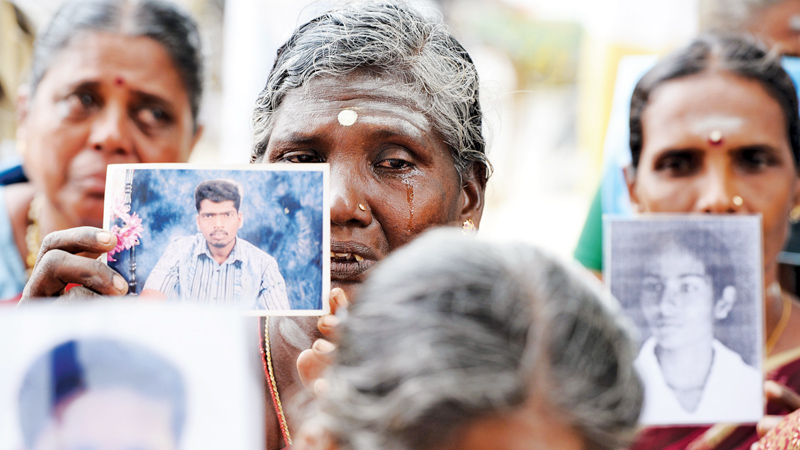Our country has a shameful past around enforced disappearances. Minister Samarasinghe in 2012 at the Universal Periodic Review (UPR) at the United Nations referred to –over 4,000 unresolved cases from the pre-1990 period with another 1089 from the 1991-2005 period. The Presidential Commission to Investigate Complaints regarding Missing Persons (hereinafter known as the ‘Paranagama Commission’) was established by the former President of Sri Lanka, Mahinda Rajapaksa, on August 15, 2013 and by June 2015, the Commission had received more than 21,000 complaints.
Several Commissions of Inquiry have drawn their own conclusions. The Coi into disappearances (All Island) had ten thousand one hundred and thirty-six complaints handed over to the Commission from the three zonal Commissions.
Suspicious death
Six thousand three hundred and forty-five were fixed for inquiry. Of those, four thousand four hundred and seventy-three were inquired into by the Commission. Of the six hundred and fifty-four complaints pertaining to returned detainees, the Commission inquired into three hundred and eighty-four of them.
If there is a suspicious death – such as a death of someone in the custody of the police – the law requires magistrates to conduct an inquiry and record all relevant evidence before the body is given for interment. In the case of a suspicious death, a magistrate would usually order an autopsy to be conducted. However, in the case of enforced disappearances, this most fundamental legal requirement is ignored. Where emergency regulations are drafted in a manner that allows for enforced disappearances, provisions are made to empower a police officer of some rank to make orders to dispose of bodies. Where no such emergency regulations are operative, those who engage in enforced disappearances give themselves the right to dispose of the body.
Taken together we have a troubled past.
The proposed act as law
* What is an enforced disappearance?
In order to be an enforced disappearance, BOTH of the following elements must be present:
-there must be a deprivation of liberty as set out in part (a) (It should be noted that this not apply to ‘missing persons’ per se but only to those who are ‘disappeared’ or subject to ‘deprivation of liberty’); AND -there must be a refusal to acknowledge the deprivation of liberty OR a concealing of the person OR a failure to disclose the whereabouts of the disappeared person. Section 3 of the proposed Act provides for the liability of NON-STATE actors, as well as superior officers who have direct control; willfully / consciously disregard information that their subordinated are engaging in enforced disappearances, or fail to take legitimate action to prevent same.
* Will this Act prevent the arrest of terrorism or other suspects, due to the way in which ‘deprivation of liberty’ is defined?
A fear has been expressed that the Act will hinder investigations.
“Deprivation of liberty” means the confinement of a person to a particular place, where such person does not consent to that confinement;
The deprivation of liberty is not criminalised or prevented by the Act. Seen in explanation of section 3, the offence is only established if there is a deprivation of liberty, coupled with a refusal to acknowledge the deprivation of liberty or a concealing of the person or a failure to disclose the whereabouts of the disappeared person.
Law enforcement authorities are entitled to arrest (in accordance with the law). This does not mean that arrested persons can be held in secret detention because that would leave room for abuse, torture, extra-judicial killings etc. The Act will not hinder investigations.
Will this Act result in the prosecution of armed forces or police personnel, for alleged offences committed during the Armed Conflict?
The Act does not have the retrospective operation, and will only apply to allegations of enforced disappearances committed after the Act comes into force. The Act is to prevent enforced disappearances in the future.
* Will the Bill result in International Prosecutions?
It is open to any country to prosecute for offences if their law provides for same. This would be so regardless of this act.
However, by providing the legal mechanism for a domestic prosecution, it would be possible for Sri Lanka to argue that it is competent to prosecute in respect of domestic violations and that there should be no international prosecutions (in an international tribunal) in respect of same. It is an accepted principle in international law that international fora will not assume jurisdiction if a crime can be effectively prosecuted in domestic fora. Section 6 specifically provides that the High Court of Sri Lanka shall have exclusive jurisdiction to try offences under the Act. Therefore, by enacting the law, Sri Lanka will be taking responsibility for the investigation and prosecution of alleged Enforced Disappearances committed within Sri Lanka, and thus be able to argue that the matter should not be prosecuted before International Fora.
* What are the rights of a victim?
- To know the truth regarding the circumstances of enforced disappearances
- To know the progress and results of the investigations relating to enforced disappearances
- To know the fate of the disappeared persons
[section 14]
* Why aren’t the provisions in the Penal Code sufficient?
The Penal Code deals with unlawful restraint and confinement. However, the scope of the proposed law is different. It deals with situations where the initial arrest may (or may not) be lawful and goes onto requiring that the arrested persons not be held in secret detention, that his location not be concealed etc. Thus the scope of the offence of Enforced Disappearance and unlawful restraint/confinement is different.
Rather than confining itself to creating a new ‘offence’, the objective of the Act is to create a culture in which Enforced Disappearances do not occur. The objective of the Bill is to ensure that Enforced Disappearances do not occur. While there can be lawful arrests, persons must be held in lawful detention centres, and their arrest documented. This will prevent torture, abuse and extra judicial killings.



Add new comment